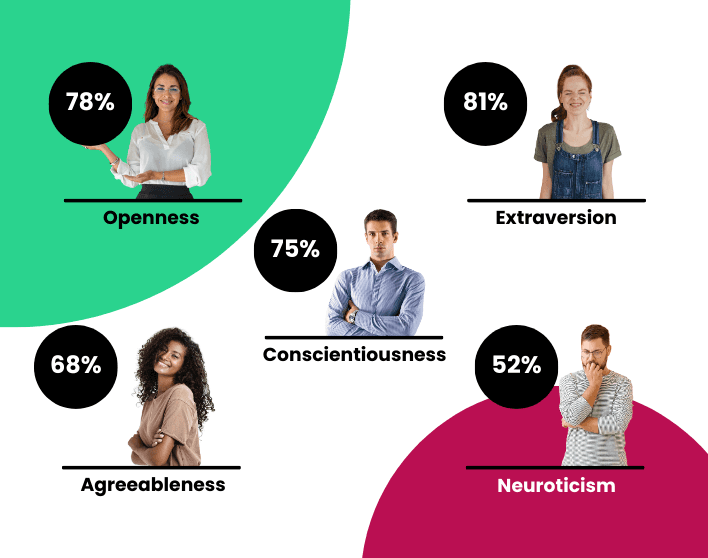The Bryq Team
HR Experts
Many of the people who apply for roles are unqualified or unsuitable for the position. So, how can you weed through candidates effectively to find out who has real potential to work in your company? Skills assessment tests are an effective method for determining who has the right skills for your job.
What Are Skills Assessment Tests?
Skills assessment tests have been designed to uncover how good candidates are at particular skills. This is incredibly useful during the hiring process when you have a lot of candidates that you are trying to differentiate between. It can help you cut down your applicants to a shortlist of people to interview – simply choose those who performed the best on your test. This can drastically cut down the time to hire.
For these pre-employment tests to provide you with valid results, the skill tested for must be relevant to the position. For example, if you’re hiring for a computer coding position, you could test the applicants’ level of attention to detail. Or you could decide to go for a job knowledge test to see whether they really have the coding skills they claim to.
These tests can be great predictors of job performance when used in the right way.
10 Ways to Use Skills Assessment Tests to Evaluate Candidates
Here are 10 ways that you can use skills assessment tests to find out who are the best candidates for the open position. Which type you will choose will depend on the requirements for the role.
Personality Tests
If you want to know how well someone will fit in at your company and in your team, you could use a personality test. These measure certain traits of the person’s personality. If you are hiring for a role that requires a certain type of personality, this can be useful. If you are hiring for a sales position, for example, you will need someone exuberant and good with people.
Emotional Intelligence tests
Emotional intelligence tests may also be referred to as soft skills assessments. They focus on how well the person understands the emotions of others, as well as their own feelings. They also look at related aspects, such as relationship building and leadership. If the role requires a ‘people person’, then an emotional intelligence test may be useful in your recruitment process.
Integrity Assessments
Integrity assessments are fairly self-explanatory – they test the integrity of the person taking it. They usually come in a survey format with direct questions based on integrity and ethics. They may test traits that are connected to integrity as well, such as conscientiousness. These tests can be excellent predictors of how that person will perform on the job.
Work sample test
Work sample tests recreate work situations to see how applicants respond. They will be asked to undertake certain tasks that they would perform in the position were they to get the job. These are sometimes also called realistic job previews, as they offer the candidate the chance to see what the job would be like.
Situational Judgment Tests
Situational judgement tests are designed to see how the potential employee would handle a situation that could come up in the workplace. For example, how they would deal with a difficult customer or react to a colleague speaking over them. As they are real examples of what could happen in the role, these tests are useful for seeing how the person would handle the challenges of the job.
Hard Skills Assessment Tests
Hard skills assessment tests vary greatly in their content, as this will need to be adapted according to the position. This type of test checks whether the candidate possesses the technical skills required for the role. For example, if you are hiring a graphic designer, you will need to check their proficiency in the design software they will be using.
Skill testing can provide a score on the candidate’s ability to perform the hard skills required for the role. This makes it simpler to narrow down your candidates by choosing those who perform the best on this test.
Verbal Reasoning Tests
A verbal reasoning test can test how well a candidate understands what they read. This can offer an insight into how well the applicants can analyze a piece of writing and take the most important details from it. This is a great way to test how well candidates understand written instructions, which is an important ability for many jobs.
Numerical Reasoning Tests
If the role you are hiring for involves working with numbers, you may consider performing a numerical reasoning test. They contain math questions including ones on percentages, ratios, and sequences. Data may be presented in tables and graphs, and the candidate is asked to answer questions on these.
Roles such as accountants or financial analysts may benefit from using a numerical reasoning test in the recruitment process.
Logical Reasoning Tests
Logical reasoning tests can tell you how well a candidate can understand shapes, sequences, and patterns. This gives you an insight into how well they can understand abstract ideas and concepts. Performing well on this test will require excellent critical thinking abilities from the candidates. This makes it a good choice to perform on candidates who are applying for a role that requires complex decision making, such as social workers or lawyers.
Interviews
You may not have realized that interviews are a type of skills assessment test, but they are. You can find out more about someone’s skills by asking them behavioral interview questions. These questions will dig into previous situations and how they have responded to them. Essentially, interviews are a self-reported skills assessment.
By using one of the above 10 methods to screen your candidates, you can make a much more informed hiring decision. When it comes time to decide who you’re going to hire, you will have plenty of information showing that this is the best person for the role. Make confident hiring decisions by adding skills assessment tests into your hiring process.








